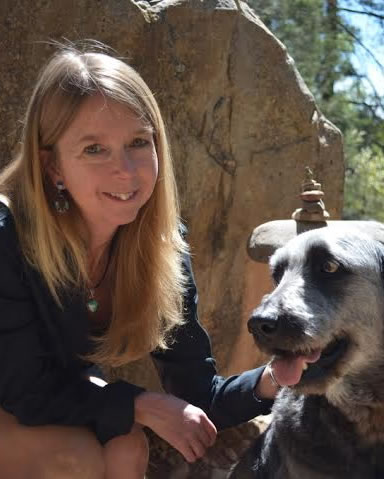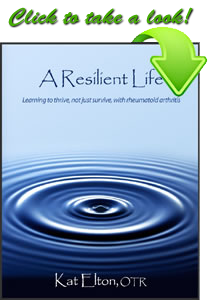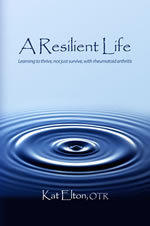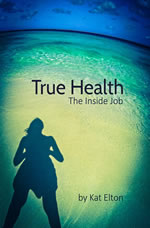From Introduction
“Mae West once said, “Old age isn’t for sissies,” I say neither is arthritis. People with arthritis are some of the toughest people I know. Put a bunch of people with arthritis in a room with professional athletes and they’d have a lot to talk about: how to push through and go beyond a pain threshold that would stop most people in their tracks, how to ignore discomfort, how the snap, crackle, and popping joints between them could create a chorus, how to pick yourself up after a fall, what it’s like to be alone out there. Professional athletes will brush off injuries because those injuries jeopardize their ability to participate in the next game. People with arthritis will brush off their pain because it jeopardizes their ability to participate period.”
From Chapter 2, Pain is a Four Letter Word
What if I’m in too much pain to relax?” This is a very valid question that doesn’t have a simple answer. Feeling relaxed can be a very rare experience when you are in pain, which can make attempting meditation or any other mindful practice very frustrating. I once attended a weekend workshop on meditation led by a Tibetan Lama. We were meditating sitting in chairs, and the minutes seemed like hours to me because I was so uncomfortable. Later when he took questions I stood up and asked how to meditate through pain. He just looked at me, and I saw his eyes soften as he said, “This is a very difficult situation.”
Later I read some of the Dalai Lama’s teachings and I found a more satisfying answer. According to the Dalai Lama, pain and suffering are two different things. Pain is a physical sensation while suffering is the mental angst we place on top of it. In our society we have come to believe pain is an affliction that needs to be eradicated. In actuality pain is a part of the experience of living. When we start to believe that we have to be comfortable all the time it places an unrealistic expectation that creates irrational thinking. Physical pain is accompanied by the real affliction, negative thoughts and emotions such as anger, envy, fear, or anxiety. So someone who has pain as their constant companion may be in a difficult situation but also has the opportunity to practice the ultimate goal, peace of mind.
Using pain as a teacher when you practice relaxation will ultimately help you gain tremendous insight into your own unhealthy thought patterns. This is a tool that people who live a more physically comfortable existence don’t have. Stop thinking about pain as an affliction and start to think of pain as a way forward. As the Dalai Lama says in his book Ethics For A New Millennium, “Gaining insight into our own negativity is a lifelong task, and one which is capable of almost infinite refinement. But unless we undertake it, we will be unable to see where to make the necessary changes in our live.”
Pain can then become, like our negative thoughts, the waves that sit on top of a sea of calm. I’m not in any way trying to downplay the effect pain has on a person’s everyday existence I’m only pointing to the fact that adding negative thoughts to the pain will be detrimental to your life. When you are practicing relaxation start by getting as comfortable as possible and when pain comes up, breath into it, examine any uncomfortable feelings that arise, and then let them go. It took me many years to realize that by fighting pain I was feeding it. Now I relax into it and find that it stops being so loud.
From Chapter 5, Nutrition, Are You What You Eat?
Food is many things and satisfies us on many levels. Food is delicious, comforting, functional, culturally relative, and can inspire awe, fear, guilt, and pleasure, sometimes all at the same time. Food can be associated with fat or starvation; it all depends on where you are and when you’ve last eaten. Food is a necessity for life and health and has never been more of a minefield in this country. Compare Americans with people in other cultures and you’ll become acutely aware of how differently we approach food. We’ve lost much of the reverence, enjoyment, and social time that is a natural accompaniment to food in most other places. We’ve replaced this with convenience, apprehension, and isolation.
The majority of true scientifically validated studies on diet and arthritis have found that rheumatoid arthritis can be significantly improved with dietary change, the catch is that most of these diets are extremely restrictive for even the most disciplined of people.
Believe me, I know. Willpower has always been one of my strong traits, but after the third week into a diet consisting of fruits, nuts, rice, and some fish, even I will start dreaming of banana splits.
For me, the rheumatoid arthritis has been added incentive to be more aware of what I feed my body with. My self education has led me to understand that no real food is inherently bad. My nutritional needs change as my body adapts to the environment it finds itself in, and as someone with a tendency towards inflammation, it’s important to ensure that my diet regularly includes foods that counteract that tendency. The most important aspect to my diet, though is the attitude with which I approach it.




